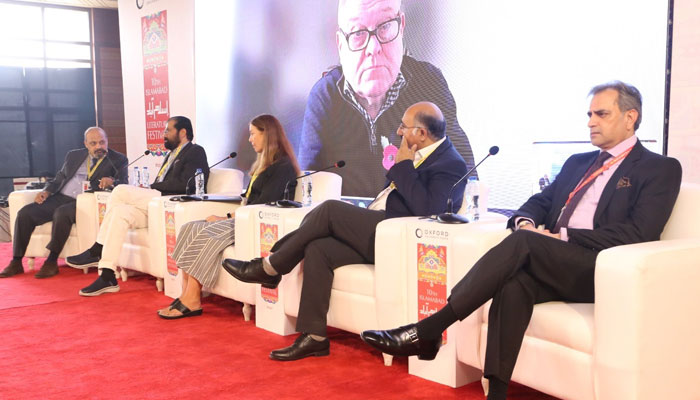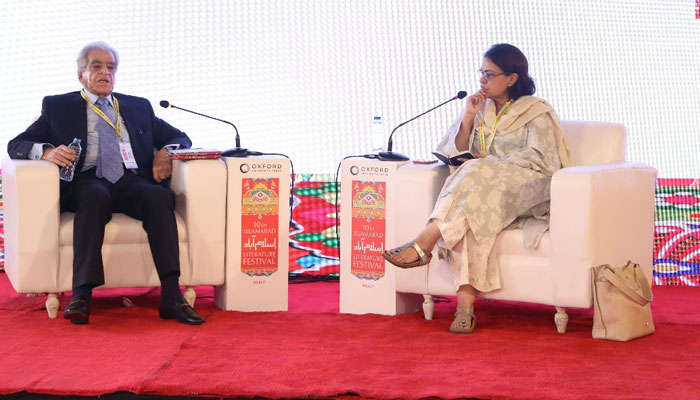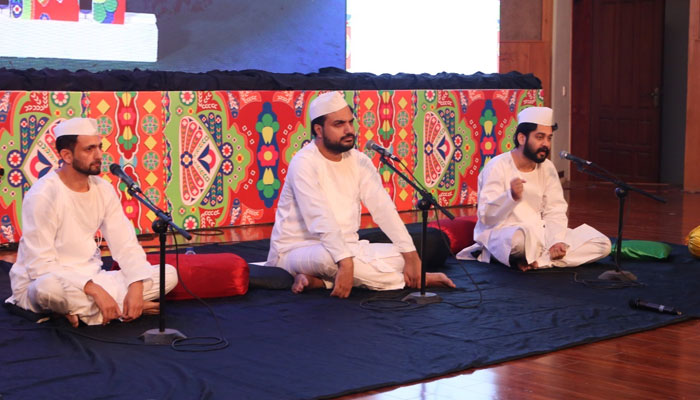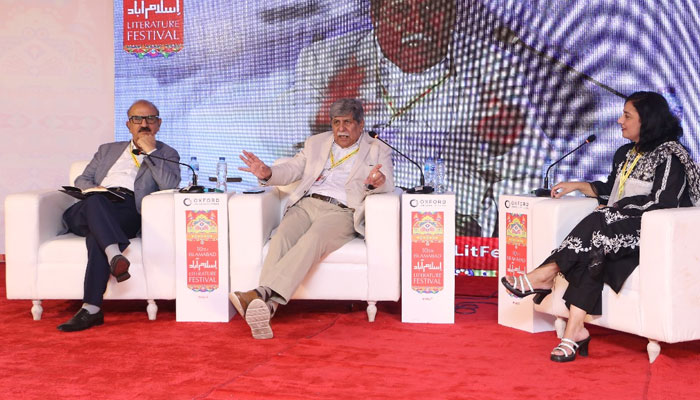
ISLAMABAD: The tenth Islamabad Literature Pageant (ILF), “Phrases Change Mindsets,” comprising 50 intellectually impressed periods, together with film screening, dance recital, mushairas, theatre, and a memorable Sufi night time, concluded with a incredible closing ceremony on the Allama Iqbal Auditorium final night.
The occasion was graced by over 100 outstanding voices in literature and artwork who spoke and mirrored as keynotes and panelists within the competition, and esteemed company.
Commenting on the transformative character of such occasions, famend author and critic Muneeza Shamsie shared: “ILF has proven us the unifying energy of phrases, fostering dialogue throughout divides and provoking change.”
Poet and author Najeeba Arif echoed the sentiment, including, “Literature shapes our views and permits us to see the world by others’ eyes.”

Arshad Saeed Husain, Managing Director, Oxford College Press Pakistan, expressed his gratitude to attendees and contributors, stating, “Our ardour and dedication is in the direction of guaranteeing that Literature continues to drive the change in the direction of a progressive and equitable society. We’re blessed to have discovered an ever-expanding group of buddies such as you to empower our mission.”
Citing the final 5 of the full seventeen e-book launches; Day 3, continued with Akbar in Wonderland by Umber Khairi. In a energetic dialog between the writer and Aamir Ghauri, Khairi shared insights on her protagonist’s challenges of social and political ethos within the nineties.

Within the Urdu fiction class, Najeeba Arif’s Mazahir o Mubahis was offered, in dialog with Abid Hussain Sial, who explored the themes of cultural id and modernity. Shahid Siddiqui’s newest work, Toronto, Dubai, and Manchester, was mentioned in a session with Asghar Nadeem Syed, highlighting Siddiqui’s narrative journey by the socio-political landscapes of three cities.
M Athar Tahir’s Telling Twilight provided a poetic exploration of nature and nostalgia, with Tahir discussing his work with filmmaker Ammar Aziz. Equally, Pani pe likhi kahani by Muhammad Asim Butt was launched in an interesting dialogue with Qasim Yaqoob, delving into Butt’s reflections on time and reminiscence.
A heartfelt session was held for My Good friend Mairaj: An Intimate Biography by Shamim Ahmad, who, in dialog with Safiya Aftab, spoke on the legacy and private reminiscences of Mairaj Muhammad Khan. In a session full of introspection and private insights, Aankh se Aasman jata hai by Tariq Naeem, was launched, with Mehboob Zafar moderating a dialog on Naeem’s distinctive poetic imaginative and prescient.

The competition additionally celebrated English poetry with the launch of Poetry in English from Pakistan, edited by Ilona Yusuf and Shafiq Naz. A various panel of poets, together with Naeem Pasha, Rayan Khan, Alamgir Hashmi, Harris Khalique, Waqas Naeem, Haseeb Sultan, Wajahat Malik, Athar Tahir, Mehvash Amin, Saad Ali, Zain Ul Abidin Khan Alizai, and Sophia Bano, offered their works, with Ammar Aziz moderating a dialogue that highlighted the wealthy tapestry of Pakistan’s English-language poetry scene.
An interesting lineup of panel discussions and periods sparked energetic conversations on various matters related to Pakistan’s socio-cultural and literary panorama. Season 2 of Capital Discuss featured a thought-provoking dialog between Hamid Mir and Meher Bukhari, concerning urgent points in journalism and public discourse.
In a well timed dialogue on social media: Free Speech vs. Censorship, panellists Farnood Alam, Husnain Jamal, and Munizae Jahangir, moderated by Khayyam Mushir, delved into the challenges of balancing freedom of expression with the necessity for accountable content material regulation. Munizae spoke of the pains of combating pretend information however insisted that censorship should change its function in the direction of defending the rights of minorities and never suppressing the voice of individuals.
The dialogue, Visible Journey: Documenting The Nationwide Artwork Gallery of Pakistan; moderated by Hammad Husain, delved into insights relating to preserving Pakistan’s heritage. Naeem Pasha’s philosophy of humility and accessibility in designing his masterpiece received hearts. “Sango Khesht needs to be subservient to Artwork and Tradition.”
A literary dialogue, Pakistani Urdu Adab ke Khud-o-Khaal, introduced collectively esteemed voices like Zehra Nigah, Iftikhar Arif, Najeeba Arif, and Abid Hussain Sial, moderated by Shakeel Jazib, to discover the evolving id of Urdu literature in Pakistan. On the query of the geography of literature, Zehra Nigah commented, “Literary moulds evolve with time to remain related – very very similar to the bodily constructions. Literature has by no means had boundaries, and it’ll keep linked to its historic legacy whereas reflecting current dynamics.” Arif Iftikhar expanded on how wealthy Pakistani literature has been with stalwarts like Ibne Insha. Yusufi, Rashid, Pitras, Faiz, and numerous extra, and the way their works are gems of the wonderful historical past and literary wonders of the Urdu language.
The session City Dialogues: Decoding Islamabad’s Dynamics with Naeem Pasha, Fauzia Asad Khan, Sikander Ajam Khan, and Hammad Husain, moderated by Hamid M Husain, examined Islamabad’s city development and social shifts. Theatre group Swaang carried out Daastan-e-Mizaah, including a cultural contact to the competition by a comedic exploration of Pakistani society.
Within the session titled Fostering a World Mindset: Co-Existence of Native and Worldwide Examination Boards, panellists together with Ghulam Ali Mallah, Amanda Ingram, Andrew Coombe, Arshad Saeed Husain, and Shahid Soroya, moderated by Faisal Bari, debated the deserves of a diversified academic method. Shahid spoke of the educational crises of fifty-four million kids at school, whereas Coombe outlined the essence of curiosity that should outline the pedagogical and evaluation goal.
One other dialogue, Pakistani English Literature: Defining a Canon featured Muneeza Shamsie, Harris Khalique, and Ilona Yusuf, guided by Aroosa Kanwal, discussing the evolution of English literature from Pakistan and the challenges in forming a literary canon. Commenting on the character of literary festivals, Harris Khalique mentioned,” Festivals might not contribute to the literary canon, however they undoubtedly allow the shift within the mindset.”
Hameed Akhtar’s legacy was revisited in Hameed Akhtar ke Sawaal with Iftikhar Arif, Saba Hamid, Asghar Nadeem Syed, and Harris Khalique, led by Shahzad Sharjeel. Exploring the financial alternatives by way of strengthening the AI infrastructure grew to become the primary dialogue level in How Pakistan can seize its share of the $2 Trillion AI Market. It noticed insights from Faisal Aftab, Owais Barlas, and Fizza Amjad and was moderated by Basit Riaz Shaikh. In Who Owns the English Language? Modern Pakistani Anglophone Fiction — Raazia Sajid, Umber Khairi, and Sonia Irum, shared their views on Pakistani writers’ contributions to Anglophone literature. The session was moderated by Aroosa Kanwal.
The constitutional discourse in We the Individuals and our Structure, that includes Hamid Khan, Ahmer Bilal Soofi, and Farhatullah Babar, with Mujahid Barelvi as moderator, delved into residents’ rights and constitutional consciousness. Our Training System and the Future Workforce Wants, with consultants AH Nayyar, Faisal Mushtaq, Shahid Siddiqui, and Shoaiba Mansoor, moderated by Faisal Bari, targeted on aligning training with workforce calls for. Shoaiba shared the replace on vocational and technical integration within the federal faculties, however all panellists agreed on the necessity for a paradigm shift with sturdy coaching, and an evaluative framework for the lecturers.
A session on digital storytelling, Past the Hype: Content material Creators Crafting Tales, included creators Huzaifa Nizam (Huztory by Huzaifa), Noman Jaffar (Islamabadwala), and Maryam Raja, moderated by Sonia Irum, exploring the affect of digital narratives. Concluding with Pindi Afsanay ka College, Hameed Shahid, Ravish Nadim, and Nilofar Iqbal, moderated by Khaleeq ur Rehman, mirrored on the distinctive narrative type rising from Pindi’s literary scene.
The ceremony concluded with a soulful Sufi night time efficiency by Akbar Ali Khan, leaving the viewers deeply moved and impressed. The competition’s closing celebrated literature’s distinctive capability to reshape views, fostering higher understanding and empathy throughout society.
